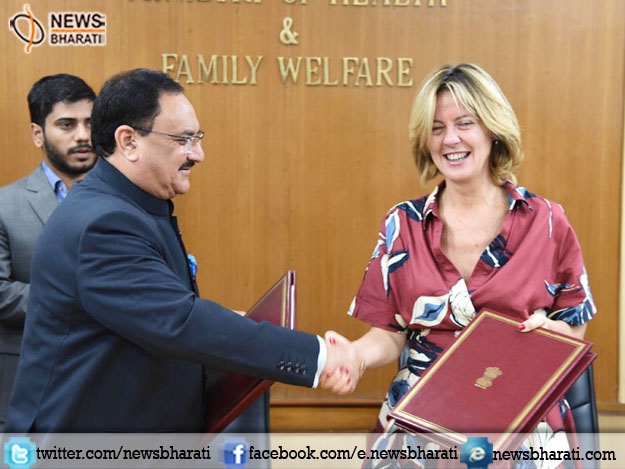India, Italy ink pact to deepen cooperation in health sector
New Delhi, November 29: India and Italy signed a Memorandum of Understanding (MoU) for enhanced cooperation in the health sector by exchanging and training of medical doctors, officials, other health professionals and experts, today.

Nadda stated that both the countries share a strong and rich traditional relationship which has been enhanced by high level visits. Also, there is a mutual interest in the promotion of stronger ties in the health sector, he added.
![]() The MoU recognizes the potential for exchanges in the health sector between the two countries and the need to tap the capabilities and opportunities in a focused and comprehensive manner, Nadda stated.
The MoU recognizes the potential for exchanges in the health sector between the two countries and the need to tap the capabilities and opportunities in a focused and comprehensive manner, Nadda stated.
![]() The objective of this MoU is to establish comprehensive inter-ministerial and inter-institutional cooperation between the two countries in the field of health by pooling technical, scientific, and financial and human resources with the ultimate goal of upgrading the quality and reach of human, material and infrastructural resources involved in health care, medical education & training, and research in both countries.
The objective of this MoU is to establish comprehensive inter-ministerial and inter-institutional cooperation between the two countries in the field of health by pooling technical, scientific, and financial and human resources with the ultimate goal of upgrading the quality and reach of human, material and infrastructural resources involved in health care, medical education & training, and research in both countries.
The main areas of cooperation include:
· Assistance in development of human resources and setting up of health care facilities;
· Short term training of human resources in health;
· Regulation of pharmaceuticals, medical devices and cosmetics and exchange of information thereon;
· Promotion of business development opportunities in pharmaceuticals;
· Procurement of generic and essential drugs and assistance in sourcing of drug supplies;
· Procurement of health equipment and pharmaceutical products;
· Collaboration in the prevention of NCDs of mutual interest, such as neurocardiovascular diseases, cancer, COPDs, mental health and dementia, with an emphasis on SDG3 and related factors;
· Collaboration in the field of climate change impact on communicable diseases and vector borne diseases;
· Nutritional aspects of food intake, including malnutrition (over-nutrition and under-nutrition) in the light of the SDG2 and organization of nutritional services;
· Safety of production, transformation, distribution and food delivery;
· Research and training of food industry operators;
· Information and communication to citizens on hygiene and food safety and healthy eating habits; and
· Any other area of cooperation as may be mutually decided upon.